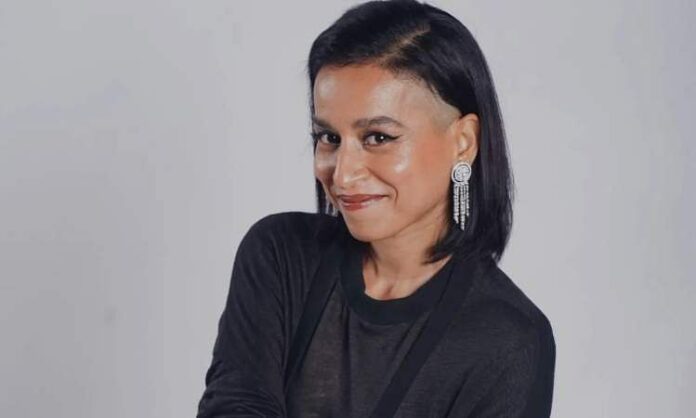Konkona Sen Sharma’s short, The Mirror, stood out amid the lacklustre narratives in the recently released Netflix anthology Lust Stories 2. The short was about lust, but it was also about loneliness. The short was about human beings finding comfort in their carnal desires, but it was also about dealing with a sense of existentialism. Tillotama Shome plays Ishita, one of the two leads of this intricately weaved narrative about desire and its machinations, with undertones of solitude. But that doesn’t stop her from showcasing carnal desire. In this conversation with CE, Tillotama opens up about getting the nuances of these layers, working with a talented filmmaker like Konkona, and much more.
Excerpts:
In terms of how lust is represented, how do you think Konkona’s gaze differs from the established male gaze?
We were fortunate to have parents, professors, family, friends, and books that helped us not internalise the mainstream male gaze. It is also about being looked at versus looking with. Can you allow the camera to go inside and look with the character and not look at them? That is a skill; you don’t have to be a woman to have that sensitivity.
How does working with a director who is also an actor help the process?
As an actor, Konkona was painfully aware of the vulnerabilities and strengths of an actor. So she worked hard to ensure we felt safe. And it was not just her behaviour and the code on set, but every beat was on paper and storyboarded. Nothing happened by chance.
How would you define the relevance of intimacy coaches on set?
They must be crucial in spaces where the actors cannot communicate what they are comfortable with to their directors and also when a director is inexperienced and awkward and can’t effectively communicate. I have never worked with an intimacy coach, but I would have demanded one if I had the slightest confusion about how the scene would be shot. In this film and in another I did, the intimate scenes were storyboarded to its last detail, and I had the agency to choose what I was comfortable with. None of this discussion happened on set, where under pressure, you may feel obliged to be ‘a good sport.’ It was all decided way in advance, in my living room, in my comfort zone. This is the respect, sensitivity and maturity of some of the directors I have worked with.
There’s a beautiful correlation between your characters in Sir and Mirror. How was it to get into the skin of both these contrasting characters
The correlation is the intersection of class and desire, but they are entirely different films. It was wonderful to play them both. As I get older, I enjoy the mess, the inscrutability of life, the questions that won’t be answered…
How do you respond to the adulation you constantly receive for your characters? Does it ever feel overwhelming?
Yes. I don’t have any paid PR yet, I have received so much love for free. And obviously, I am grateful for that. The first two days, I enjoyed it so much. My parents were so proud, and after that, as the floodgates opened and there was an outpouring of love. Soon, my body packed up, my brain went a bit numb, and I had to run away to my family. I stopped looking at my phone and instead read my books and returned to doing things I needed to do beyond the world of films.
Despite having repetition in scenes in Mirror, you exhibit a sense of freshness every single time as you adjust yourself with your newfound fascination. How much of it was you? And how much of it was Konkona?
I will never know the answer to this question. Film is a director’s medium. So it would be safe to say it’s mostly Konkona and a little bit of me. For example, in a scene, I never portrayed the vulnerability of the character, and yet I felt it when I watched it! How does that happen? The editing choice and the music…bring in the vulnerability that was never performed. So performance is an ingredient that is then tempered and manipulated to serve the story the director wants to tell.
You have made quite a strong mark in the evolving space of OTT. Does this medium give you more freedom to work?
In the last two years, I have been gifted with such different kinds of roles that I am truly grateful. I am now on a voluntary break to replenish myself, and to not get caught up in this wave of praise as all waves that go up also go down. I need to figure out what I want to do next and take my time with it.
Be it your posts about your appearance, career graph or age, you are refreshingly candid about breaking these stereotypes. How important is it for you to address these conversations and ensure you break the clichés?
I am not sure about that, but it’s not my agenda. I don’t want to be a flagbearer of anything. I will question my biases and not bore myself. Thankfully, I have enough people in my life who will pull me up if I get obnoxious.
What is it about today’s cinema or series that excites you the most?
The focus is solely on the writers, writers and obviously writers.
You have been getting widely noticed lately in the widespread content space with The Night Manager and Lust Stories, but do you ever think this recognition came a bit late?
Better late than never. Typically, in the performing arts, it takes time to find your own voice, so it’s pretty commonplace to be a late bloomer.
#takes #time #find #voice #performing #arts #Cinema #express

